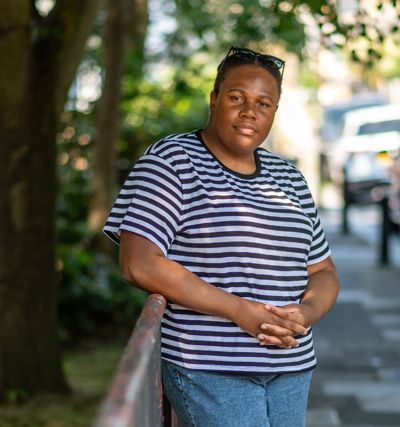Anti-Racism Progress Report
March 2024
The murder of George Floyd at the hands of police officers in Minneapolis in May 2020 was not, sadly, an isolated incident.
What it did do was light the touchpaper for a level of global outrage that had not been seen for many decades, if ever before. It caused a long overdue reckoning.
Recognising that we had not made the progress we ought to have in relation to the intersection between mental ill health and race, Rethink Mental Illness brought in an expert independent consultancy to review our practice around race.
The eventual report published was a painful read for colleagues and kickstarted an ambitious programme of work to become anti-racist, including our June 2022 Race Equality Action Plan outlining our short, medium and long-term plans.
Our latest Anti-Racism Progress Report is an open, honest and frank assessment of the progress we have made and the distance we still have to go.
It is not a list of everything we have done over the last two years. It's a look at the key activities and the foundational changes we have made to becoming a truly anti-racist organisation.
Report Summary
Anti-racist leadership and governance
We have created a robust and appropriate anti-racist leadership and governance framework to support the implementation of our anti-racist strategy and plans.
We recruited an Associate Director for Race Equality in February 2022 to co-produce the Race Equality Action Plan with its three workstreams:
- Embedding strategic oversight and implementation of the Race Equality Acton Plan.
- Enabling our ethnically diverse colleagues to thrive and progress in an anti-racist workplace.
- Providing our minoritised service users with the optimal support where and when it is needed.
Anti-racist employer
Since our People and Occupational Development team created a strategy focusing on employer brand and inclusive recruitment, we are encouraged to see our overall ethnic minority workforce has increased over the last three years from 11% in 2021 to 15% in 2023.
Our ‘Head of’ pools remained static between 2022 and 2023 and, disappointingly, we had a 1% decrease in the ethnic minority representation in our Manager pool in 2023.
Ethnic minority representation in our frontline and administrative grades increased by 4% since 2021 from 12% to 16% in 2023.
We will continue to collect this data and intensify our efforts to close the gaps in our ethnic minority representation where at all levels in our workforce.
Mutual mentoring
We ran our mutual mentoring programme from January to June 2023. Mutual mentoring is a collaborative, non hierarchal developmental relationship where both parties are responsible for mentoring and actively supporting each other’s development.
The two main objectives of the programme were to:
- Educate our Executive, Director and Associate Director groups of the lived experience of the ethnic minority co-mentors.
- Provide the ethnic minority co-mentors with career mentoring and advice through conversation and career plans.
There were three briefing sessions with the participants - at the beginning, middle and end of the programme and the participants were supported with a comprehensive mutual mentoring toolkit.
-
“The programme has been a really valuable experience so far, especially for someone who is relatively new to Rethink Mental Illness. It has been a really good opportunity for me to learn more about career progression within the organisation with someone I likely have not crossed paths with outside of the mutual mentoring programme.”
Co-mentor Co-mentor
Anti-racist campaigner and service provider
Racialised communities, particularly Black communities, have been subject to disproportionate and adverse inequalities in their access, experience and outcomes in mental health services in the UK for far too long.
There are also longstanding and unacceptable inequalities faced by racialised communities in their access to and experience of mental health services.
We have been tackling this inequity using our influence and reach through policy, campaigning and evidence and impact work, including:
- Providing the government with recommendations on the Draft Mental Health Bill.
- Co-producing a Black Mental Health Manifesto with other charities and organisations.
- Improving our data collection of people who use our services to improve our care and support.
- Analysing the gap in support, and increased discrimination, experience by Gypsy Roma and Traveler communities.
Looking ahead
We are encouraged by the feedback from our Black and ethnic minority colleagues, external partners and stakeholders on the progress we have made and who have
helped to keep us on track.
But we are not and can never be complacent. This work is never complete - it is a continuous, iterative process of change, requiring adjustment and particularly against external challenges.

